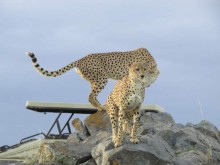Private guides and guided tours in Cote d`Ivoire
Private guides in Cote d`Ivoire
Private Guide in Abidjan - Williams
(Member Since 2024) Excursions/tous in the following cities: Abidjan Languages: EnglishMy name is Williams and I have lived most of my live in Abidjan. With my education, exposure and experience as a tour guide I will be an asset to your trip to Ivory Coast. Not only I am well versed in my...

Cote d`Ivoire
Language: French
Currency: Communaute Financiere Africaine franc (XOF, XAF)
Calling Code: +225
CAPITAL CITY OF Cote d`Ivoire: Yamoussoukro
LANGUAGE OF Cote d`Ivoire: French
CURRENCY OF Cote d`Ivoire: Communaute Financiere Africaine franc (XOF, XAF)
COMMENTS ABOUT Cote d`Ivoire:
Côte d'Ivoire (also referred to as "Ivory Coast") is a country in West Africa.
Cities : Abidjan, Korhogo, Aboisso, Bouake, Dabou, San-Pedro, Yamoussoukro (capital), Grand-Bassam
Besp Places : Taï National Park, Comoe National Park
Calling code :+225
Time zone : GMT (UTC+0)
Close ties to France since independence in 1960, the development of cocoa production for export, and foreign investment made Cote d'Ivoire one of the most prosperous of the tropical African states, but did not protect it from political turmoil. On 25 December 1999, a military coup - the first ever in Cote d'Ivoire's history - overthrew the government led by President Henri Konan BEDIE. Junta leader Robert GUEI held elections in late 2000, but excluded prominent opposition leader Alassane OUATTARA, blatantly rigged the polling results, and declared himself winner. Popular protest forced GUEI to step aside and brought runner-up Laurent GBAGBO into power. Ivorian dissidents and disaffected members of the military launched a failed coup attempt in September 2002. Rebel forces claimed the northern half of the country and in January 2003 were granted ministerial positions in a unity government under the auspices of the Linas-Marcoussis Peace Accord. President GBAGBO and rebel forces resumed implementation of the peace accord in December 2003 after a three-month stalemate, but issues that sparked the civil war, such as land reform and grounds for nationality remain unresolved. The central government has yet to exert control over the northern regions and tensions remain high between GBAGBO and rebel leaders. Several thousand French and West African troops remain in Cote d'Ivoire to maintain peace and facilitate the disarmament, demobilization, and rehabilitation process.
CLIMATE OF Cote d`Ivoire: Tropical along coast, semiarid in far north; three seasons - warm and dry (November to March), hot and dry (March to May), hot and wet (June to October). The coast has heavy surf and no natural harbors; during the rainy season torrential flooding is possible.
RELIGION OF Cote d`Ivoire: Christian 20-30%, Muslim 35-40%, indigenous 25-40% (2001) - the majority of foreigners (migratory workers) are Muslim (70%) and Christian (20%)
POPULATION OF Cote d`Ivoire: 17,327,724 - estimates for this country explicitly take into account the effects of excess mortality due to AIDS; this can result in lower life expectancy, higher infant mortality and death rates, lower population and growth rates, and changes in the distribution of population by age and sex than would otherwise be expected (July 2004 est.)>>
HISTORY OF Cote d`Ivoire: Little is known about Côte d'Ivoire before the arrival of Portuguese ships in the 1460s. The major ethnic groups came relatively recently from neighbouring areas: the Kru people from Liberia around 1600; the Senoufo and Lobi moved southward from Burkina Faso and Mali. In the eighteenth and nineteenth centuries the Akan people, including the Baoulé, migrated from Ghana into the eastern area of the country, and the Malinké from Guinea into the north-west.
ECONOMY OVERVIEW OF Cote d`Ivoire: Cote d'Ivoire is among the world's largest producers and exporters of coffee, cocoa beans, and palm oil. Consequently, the economy is highly sensitive to fluctuations in international prices for these products and to weather conditions. Despite government attempts to diversify the economy, it is still heavily dependent on agriculture and related activities, which engage roughly 68% of the population. After several years of lagging performance, the Ivorian economy began a comeback in 1994, due to the 50% devaluation of the CFA franc and improved prices for cocoa and coffee, growth in nontraditional primary exports such as pineapples and rubber, limited trade and banking liberalization, offshore oil and gas discoveries, and generous external financing and debt rescheduling by multilateral lenders and France. Moreover, government adherence to donor-mandated reforms led to a jump in growth to 5% annually during 1996-99. Growth was negative in 2000-03 because of the difficulty of meeting the conditions of international donors, continued low prices of key exports, and severe civil war. Political uncertainty will continue to cloud the economic outlook in 2004, but rising world prices for cocoa will help both the current account and the government balances.



 French
French Spanish
Spanish Russian
Russian


